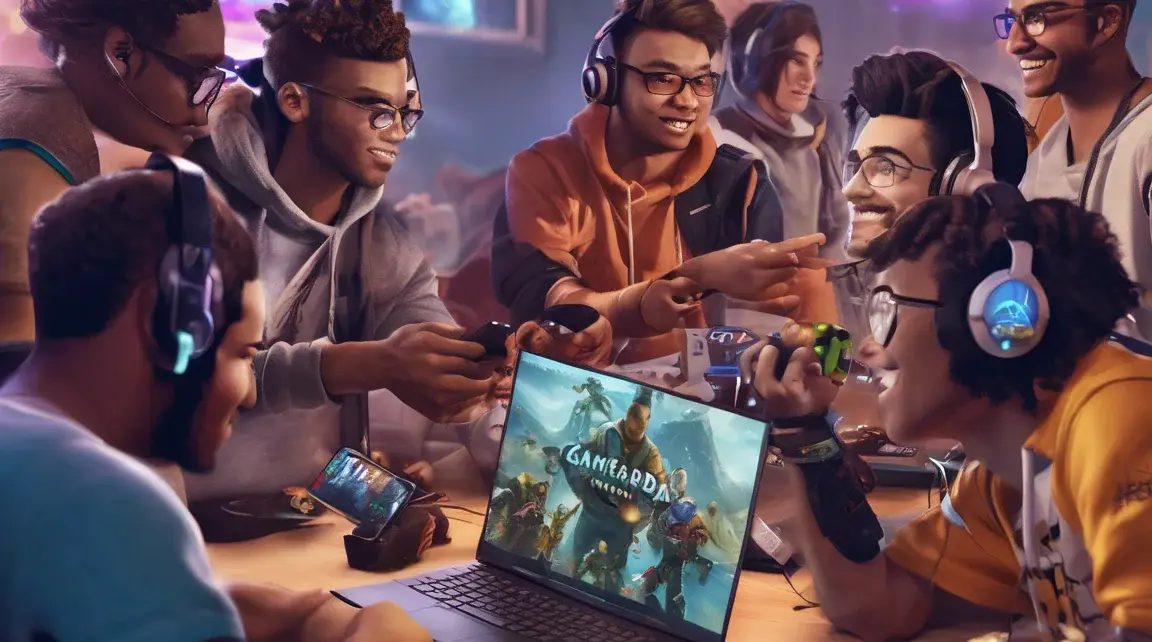Introduction: More Than Just a Game
Gaming isn’t just about high scores and epic battles anymore—it’s about connection, collaboration, and community. With the rise of online platforms and multiplayer environments, gamers have evolved into global communities that transcend borders, languages, and even generations. Whether you’re strategizing in League of Legends, sharing mods in Minecraft, or catching up on a Discord server, online gaming communities have become an essential part of the gaming experience.
This comprehensive guide explores the evolution, benefits, influence, and future trends of online gaming communities—and why they matter more than ever.
Chapter 1: The Origins of Online Gaming Communities
Early Days: Forums, LAN Parties, and Message Boards
The roots of online gaming communities go back to the 1980s and 1990s, long before high-speed internet or social media. LAN parties (Local Area Network meetups) were the earliest forms of multiplayer interaction, where friends physically gathered to connect computers and compete in games like Doom and Quake.
At the same time, bulletin board systems (BBS) and gaming forums began hosting discussions where early adopters shared tips, cheats, and walkthroughs. These platforms laid the groundwork for the social interaction that would later define gaming culture.
The Rise of Multiplayer and MMORPGs
The real shift began with massively multiplayer online games (MMORPGs) like EverQuest and World of Warcraft. These titles allowed players to interact in persistent worlds, form alliances, join guilds, and embark on quests together—turning isolated players into thriving digital communities.
As internet speeds improved and technology advanced, more gamers could join from around the world. With voice chat tools like Ventrilo, TeamSpeak, and eventually Discord, coordination and communication became seamless.
Social Media + Gaming = A Global Connection
The integration of social media supercharged these communities. Gamers weren’t just chatting in-game—they were posting on Reddit, uploading to YouTube, streaming on Twitch, and organizing events on Facebook or Twitter.
Suddenly, gaming became a lifestyle, and the community extended far beyond the game itself.
Chapter 2: The Social Benefits of Online Gaming Communities
1. Building Real Friendships Through Virtual Worlds
One of the most powerful aspects of gaming communities is their ability to foster genuine friendships. What starts as a co-op mission or a PvP match often grows into long-lasting relationships. Many gamers have built lifelong bonds with people they’ve never met in person.
Whether it’s playing Destiny 2 with a clan, chatting strategy in a Call of Duty Discord, or joining Twitch streams with other fans, the shared passion creates a strong social fabric.
2. Combatting Loneliness and Providing Emotional Support
For many, gaming communities provide a safe haven—a place where they can be themselves, express their thoughts, and feel accepted. These spaces can reduce social isolation and even help people struggling with anxiety, depression, or low self-esteem.
Communities often serve as support groups, especially during challenging times. Whether it’s venting in a chat, receiving encouragement after a tough loss, or celebrating small victories, these interactions can make a significant impact on mental health.
3. Encouraging Teamwork and Communication Skills
Team-based games naturally teach cooperation, leadership, and communication. Players must coordinate strategies, listen to others, and work together toward shared objectives—skills that translate well into the real world.
In competitive gaming, this becomes even more critical. Esports teams, for example, thrive on synchronized movements, trust, and high-level communication.
Chapter 3: The Influence of Communities on Game Development
Gamers as Co-Creators: The Rise of Player Feedback
Today’s developers know that listening to the community is not just helpful—it’s essential. Player feedback influences everything from game mechanics and balancing to storylines and DLC content.
Studios now use early access programs, beta testing, and community surveys to gather insights directly from their audiences. Games like:
- No Man’s Sky: Rebuilt almost entirely based on player criticism and feedback
- Warframe: Features updates driven by Reddit discussions and Devstreams
- Fortnite: Regularly adapts to community trends and suggestions
These examples prove that community-driven development leads to more engaging, polished experiences.
Modding and User-Generated Content
Some communities go even further, creating their own content through mods and custom levels. Games like Skyrim, Minecraft, and The Sims have thriving modding communities that extend a game’s life cycle and enhance creativity.
Studios that embrace this—by providing toolkits and open-source support—foster innovation and build player loyalty.
When Feedback Goes Too Far
However, involving the community isn’t always smooth sailing. Developers must balance player input with artistic vision. Trying to please everyone can result in watered-down experiences, so the key lies in prioritizing feedback that aligns with the game’s core goals.
Chapter 4: Technology and Tools That Power Online Communities
The Evolution of Communication Platforms
In-game chat has evolved from simple text boxes to full-fledged voice and video integration. Tools like:
- Discord – The most popular platform for real-time voice, text, and video chat
- Reddit – A hub for game-specific subreddits, fan theories, and developer Q&As
- Twitch & YouTube – Platforms that blur the line between gaming, entertainment, and community
These platforms make 24/7 interaction possible, whether you’re playing, watching, or just talking.
Cross-Platform Play and Cloud Gaming
Modern gaming communities are no longer confined by console or PC. With the rise of cross-platform gaming, players on PlayStation, Xbox, PC, and mobile can join forces in titles like Fortnite, Rocket League, and Call of Duty: Warzone.
Cloud gaming platforms like Xbox Cloud Gaming and NVIDIA GeForce Now further break down barriers, allowing players to access games and communities from almost any device.
Virtual Reality and the Future of Immersive Community
Virtual Reality (VR) is poised to transform how communities interact. Imagine attending a digital convention, exploring fantasy worlds, or joining guild meetings—all in 360-degree virtual space. VR chatrooms, immersive worlds like VRChat, and upcoming metaverse-style games are already giving us a taste of this future.
Chapter 5: Challenges Faced by Online Gaming Communities
Toxicity, Harassment, and Moderation
With the rise of community comes the challenge of toxicity. Harassment, trolling, and offensive behavior can undermine even the most vibrant groups. Effective moderation, automated tools, and community guidelines are essential to keep spaces safe and inclusive.
Security and Privacy Concerns
As gaming platforms evolve into social hubs, protecting personal information becomes more critical. Account security, data protection, and educating users on digital safety should be top priorities for developers and community leaders alike.
Balancing Inclusivity and Freedom of Expression
Online gaming spaces must walk the line between free expression and respectful communication. Inclusivity initiatives—such as better representation, accessible controls, and gender-neutral environments—are helping create a welcoming space for all gamers, regardless of background.
Chapter 6: What’s Next? The Future of Online Gaming Communities
AI-Powered Personalization and Assistance
Future communities will use artificial intelligence to personalize content, match players with similar interests, and even offer in-game coaching based on performance. AI chatbots may also provide 24/7 community support or help moderate discussions more efficiently.
Blockchain and Community Governance
With the emergence of blockchain gaming, players may one day vote on game updates, own in-game assets, or even co-develop new features through decentralized communities.
Games like Axie Infinity and Illuvium are exploring these possibilities, blending play with ownership and governance.
The Metaverse and Social-First Gaming
Online gaming communities may soon form the backbone of the metaverse—a shared virtual space for socializing, gaming, and collaboration. As companies like Meta, Epic Games, and Roblox invest in immersive digital environments, expect gaming communities to lead the way.
Conclusion: Why Online Gaming Communities Matter More Than Ever
Online gaming communities have grown from small forum threads to global ecosystems that shape how we play, socialize, and evolve as individuals. These communities:
- Foster real friendships and emotional support
- Drive innovation and influence game development
- Build safe, inclusive, and passionate spaces
- Represent the future of immersive, connected gaming experiences
Whether you’re new to gaming or a seasoned veteran, there’s a place for you in this ever-growing digital world. As technology advances and community bonds deepen, the future of gaming is social, inclusive, and more connected than ever before.




